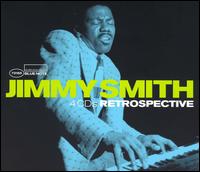Home » Jazz Articles » Extended Analysis » Jimmy Smith: Jimmy Smith: Retrospective
Jimmy Smith: Jimmy Smith: Retrospective
 Jimmy Smith
Jimmy SmithRetrospective
Blue Note
2004
With the proliferation of Hammond B-3 organ players that have emerged in the past ten years including Joey DeFrancesco, Larry Goldings, John Medeski and Dan Wall, it's hard to imagine a time when the instrument wasn't a common texture And, as the liner notes to the long-overdue four-disc look at B-3 progenitor Jimmy Smith's early career on Blue Note, Retrospective , say: "Jimmy Smith did not invent jazz organ, or the Hammond B-3 for that matter - it just seems that way." To be certain, there were earlier precedents with the use of the Hammond in soul/rhythm and blues combos by converted pianists including Milt Buckner, "Wild" Bill Davis and Bill Doggett, but it was Smith who literally redefined the potential of the instrument.
While grease and grit were (and still are) more often than not a part of Smith's vernacular, he also demonstrated a solid understanding of a more advanced harmonic language that incorporated a clear understanding of bebop, and single-handedly brought the instrument to prominence as a self-accompanying instrument, mastering the bass pedals to the point where a bassist became, quite literally, superfluous. In fact, over the course of this 38-song collection, culled from Smith's earliest recordings with the label that helped build his reputation, there's nary a bassist to be found. And Smith's most common format-of-choice - guitar, organ and drums - would become a model for others to follow, including guitarists Wes Montgomery and, more recently, John Abercrombie, whose mid-'90s trio with Dan Wall and Adam Nussbaum brought the format into a more modern context.
Disc one of the collection focuses on Smith's early trio recordings with guitarist Thornel Schwartz and drummers Bay Perry and Donald Bailey - Bailey becoming a fixture with Smith throughout the majority of his Blue Note recordings, with the exception of Art Blakey who worked with Smith on a handful of sessions in February, '57 and, again, the following year in February, '58. Bailey demonstrates a defter touch and more innate sense of groove than Perry, making tracks like Dizzy Gillespie's up-tempo "The Champ" and Smith's equally-propulsive Afro-Latin "Judo Mambo" swing along like mad. Schwartz, while occasionally not quite making the energetic bop lines that he attempts, still manages to be a suitable solo foil for Smith, contributing rich accompaniment on the trio's soulful rendition of the classic standard, "Willow Weep for Me."
With Smith's prodigious technique, mind-boggling independence of hands and feet on the keyboards and bass pedals, and progressive use of the stops on the B-3 creating a tapestry of timbres, it wasn't long before he had caught the ear of more than just the listening public - other musicians were beginning to stand up and take notice. Disc Two features Smith with other Blue Note stable-mates including Blakey, saxophonist Lou Donaldson and guitarist Kenny Burrell. Their version of Charlie Parker's "Yardbird Suite," from Jimmy Smith at the Organ demonstrates how it is possible to combine more complex improvisational flare with an indubitable, almost primal sense of soul. Nowhere is Smith's impeccable sense of time more evident than on his reading of the classic Gershwin ballad "Summertime" where, in duet with Donaldson, Smith manages to carry everything from a sensitive and gently-swinging accompaniment for Donaldson to a remarkably self-sufficient solo section where, a Capella, Smith is like a miniature orchestra all on his own.
Disc Three opens with the 20-minute "The Sermon," which continues to assert Smith's relaxed sense of groove in a sextet with Donaldson, Blakey, Burrell, trumpeter Lee Morgan and tenor saxophonist Tina Brooks. Lengthy blues such as this can often overstay their welcome, but with a loose and instinctive swing that is so natural, so physically-engaging, the time simply flies by. And as much as Smith is attracted to contemporary bebop like Monk's "Hackensack," he's equally drawn to gospel-inflected numbers like Ray Charles' "I Got a Woman," where Smith and Burrell seem engaged in an ongoing playful conversation. Even traditional tunes like "When Johnny Comes Marching Home" get the Smith treatment - shifting between Bailey's militaristic rolls and a relaxed medium-tempo swing that highlights the playing of guitarist Quentin Warren, another Smith collaborator who, like Burrell, combines an economical blues approach with broader harmonic conceits.
Disc four features more Smith staples, including "Back at the Chicken Shack," a tune that has become a standard for blues bands everywhere, but with a lighter and more subtle touch than most versions to follow. Bailey lightly drives Smith's more insistent bass pedal work and saxophonist Stanley Turrentine delivers a blues-drenched solo that is a harbinger of things to come. From the slow grind of "Pork Chop" to the gospel touch of "Can Heat," and from the tender balladry of "Come Rain or Come Shine" to the light shuffle of "Prayer Meetin'," Smith's reputation by this time was secure as an innovator who blurred the lines between rhythm and blues, gospel and jazz.
While '63's Rockin' the Boat would be Smith's last recording for Blue Note until the mid-'80s when he would return temporarily, and some of Smith's Verve sides later in the decade and into the '70s would both find him furthering his reputation in collaboration with artists including Wes Montgomery and finally see him working with the occasional bassist, it is unquestionably his early recordings for Blue Note that established his name and position as the man to bring the Hammond B-3 to jazz. While others would go on to further innovation, their debt to Smith is clear. While the instrument would, no doubt, have eventually found its way into a jazz context without him, there is little doubt that without Smith's forward-thinking ideas about its role as a self-accompanying and orchestral instrument the Hammond's role would be significantly changed. Retrospective is both a terrific entry point for new listeners and a confirmation for existing ones of Smith's monumental role in the history of jazz, one that has been compared to the landmark innovations of guitarist Charlie Christian, and with good reason.
Personnel: Jimmy Smith (organ), with collective personnel: Thornel Schwartz (guitar), Bay Perry (drums), Donald Bailey (drums), Donald Byrd (trumpet), Lou Donaldson (alto saxophone), Hank Mobley (tenor saxophone), Eddie McFadden (guitar), Art Blakey (drums), Kenny Burrell (guitar), Lee Morgan (trumpet), Curtis Fuller (trombone), George Coleman (alto saxophone), Tina Brooks (tenor saxophone), Philly Joe Jones (drums), Percy France (tenor saxophone), Blue Mitchell (trumpet), Grant Green (guitar), Jackie MacLean (alto saxophone), Ike Quebec (tenor saxophone), Quentin Warren (guitar), Stanley Turrentine (tenor saxophone), John Patton (tambourine), Grady Tate (drums), Errol "Crusher" Bennett (percussion)
Track Listing: Disc one: You Get 'Cha; The Preacher; The Champ; Bayou; Judo Mambo; Willow Weep for Me; Fiddlin' the Minors; Well, You Needn't; Get Happy; Groovy Date Disc two: Yardbird Suite; Summertime; All Day Long; The Duel; I Can't Get Started; Body and Soul; Slightly Monkish; Blues After All; 'Round Midnight Disc three: The Sermon; Flamingo; Hackensack; I Got a Woman; See See Rider; When Johnny Comes Marching Home; Sista Rebecca; Old Folks Disc four: Back at the Chicken Shack; Minor Chant; Midnight Special; The Jumpin' Blues; Squeeze Me; Ain't No Use; Pork Chop; Can Heat; Come Rain or Come Shine; Prayer Meetin'; Fungii Mama
Track Listing
Disc one: You Get 'Cha; The Preacher; The Champ; Bayou; Judo Mambo; Willow Weep for Me; Fiddlin' the Minors; Well, You Needn't; Get Happy; Groovy Date
Disc two: Yardbird Suite; Summertime; All Day Long; The Duel; I Can't Get Started; Body and Soul; Slightly Monkish; Blues After All; 'Round Midnight
Disc three: The Sermon; Flamingo; Hackensack; I Got a Woman; See See Rider; When Johnny Comes Marching Home; Sista Rebecca; Old Folks
Disc four: Back at the Chicken Shack; Minor Chant; Midnight Special; The Jumpin' Blues; Squeeze Me; Ain't No Use; Pork Chop; Can Heat; Come Rain or Come Shine; Prayer Meetin'; Fungii Mama
Personnel
Jimmy Smith
organ, Hammond B3Jimmy Smith (organ), with collective personnel: Thornel Schwartz (guitar), Bay Perry (drums), Donald Bailey (drums), Donald Byrd (trumpet), Lou Donaldson (alto saxophone), Hank Mobley (tenor saxophone), Eddie McFadden (guitar), Art Blakey (drums), Kenny Burrell (guitar), Lee Morgan (trumpet), Curtis Fuller (trombone), George Coleman (alto saxophone), Tina Brooks (tenor saxophone), Philly Joe Jones (drums), Percy France (tenor saxophone), Blue Mitchell (trumpet), Grant Green (guitar), Jackie MacLean (alto saxophone), Ike Quebec (tenor saxophone), Quentin Warren (guitar), Stanley Turrentine (tenor saxophone), John Patton (tambourine), Grady Tate (drums), Errol
Album information
Title: Jimmy Smith: Retrospective | Year Released: 2005 | Record Label: Blue Note Records
Tags
PREVIOUS / NEXT
Support All About Jazz
 All About Jazz has been a pillar of jazz since 1995, championing it as an art form and, more importantly, supporting the musicians who make it. Our enduring commitment has made "AAJ" one of the most culturally important websites of its kind, read by hundreds of thousands of fans, musicians and industry figures every month.
All About Jazz has been a pillar of jazz since 1995, championing it as an art form and, more importantly, supporting the musicians who make it. Our enduring commitment has made "AAJ" one of the most culturally important websites of its kind, read by hundreds of thousands of fans, musicians and industry figures every month.




















